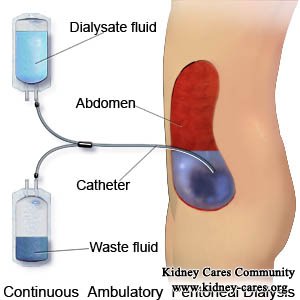 Search
Search
 Search
Search
 Peritoneal dialysis (PD), secondary to hemodialysis, is used commonly in people with end stage kidney disease. For people on peritoneal dialysis, hernia is one potential complication. Do you how does peritoneal dialysis cause hernias or how to deal with hernias? If not, try to find the answer here.
Peritoneal dialysis (PD), secondary to hemodialysis, is used commonly in people with end stage kidney disease. For people on peritoneal dialysis, hernia is one potential complication. Do you how does peritoneal dialysis cause hernias or how to deal with hernias? If not, try to find the answer here.
The cause of hernias in peritoneal dialysis
A hernia occurs easily when an organ or fatty tissue squeezes through a weak spot in the surrounding muscle or connective tissue named fascia. With peritoneal dialysis, the pressure within abdominal cavity raises largely. This leads to hernias easily. Generally, there are four types of hernias happening on peritoneal dialysis:
1. Umbilical hernia
2. Inguinal hernia
3. Exit site hernia
4. Incisional hernia
Among them, the former two types are more common for patients on peritoneal dialysis.
How to treat hernias in peritoneal dialysis?
Until now, surgery is the fundamental way to cure hernia completely, but it doesn’t mean all people with hernias need to do such a surgery. If your condition isn’t serious, you can choose some medicines to ease your symptoms including abdominal distension, abdominal pain and constipation.
Many people, who are bothered by long-term peritoneal dialysis or its complications, have consulted us whether there is an effective treatment to help them get rid of these complications completely. Here, we would like to introduce such a treatment, called the therapy of blood stasis.
This new therapy, compared with conventional dialysis, can cleanse patients’ blood more thoroughly. With the help of various blood purifications like plasma exchange and medicines, the therapy of blood stasis can remove the waste products both in the blood vessels and sticking to vascular walls. Through providing a normal blood circulation, damaged kidney cells can get enough nutritions and oxygen. In this condition, some herbal medicines are used to increase these cells’ self-curative ability. Over time, more and more damaged kidney cells can be repaired, so patients can get rid peritoneal dialysis and its complications largely.
If you want to find an effective treatment to treat your hernia and avoid further peritoneal dialysis, you can try this new treatment. Now, more and more patients can get benefits from this therapy. Hope you can be the next one.